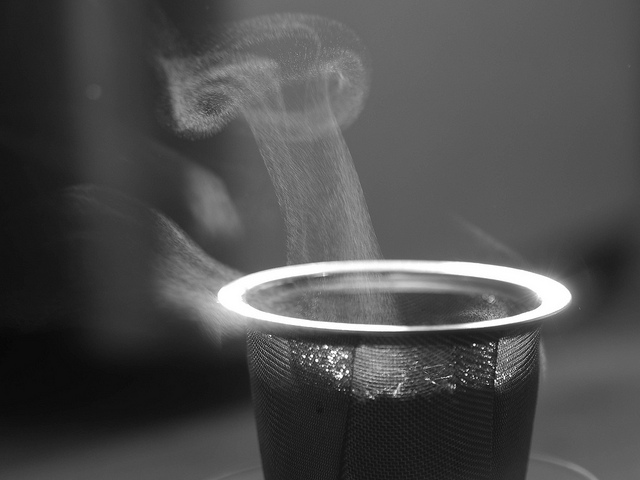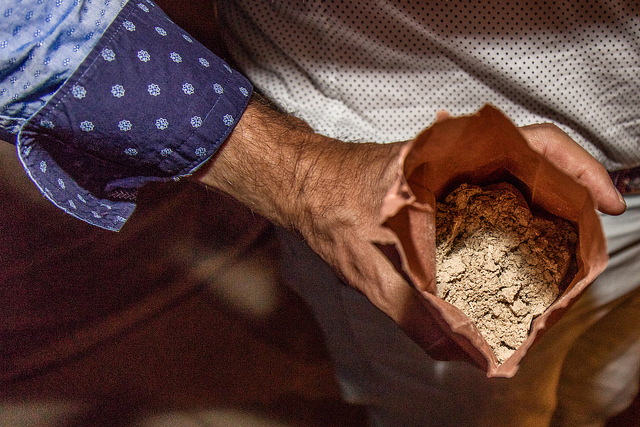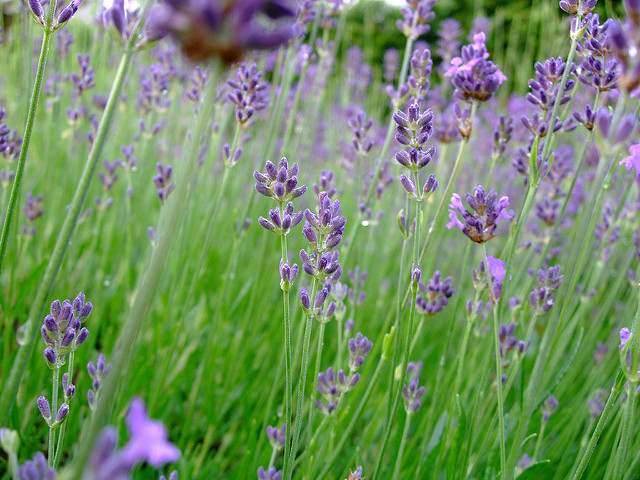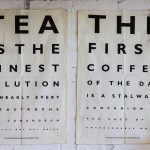Anxiety sucks. It makes you feel like the world is moving too fast and you just want everything to stop. I get it from time to time, but it’s better than it used to be. In the past I tried SSRI anti-anxiety drugs, and I have several family members that still use them, but in my case they don’t do a whole lot and they aren’t worth the side effects. For some people they work great, and if that’s you, keep using them.
What works best for me is a balanced lifestyle. So before I dive into the article, let me mention that tea cannot replace proper sleeping habits, a consistent exercise routine, and good nutrition. Tea is good for relieving mild anxiety and helping you de-stress after a chaotic day at work. However, if you are suffering from consistent acute anxiety or panic attacks, please consult your doctor.
Ok, now onto the tea. There are basically two routes you can go with this: traditional caffeinated tea, or herbal teas. Avoid the caffeinated tea if it’s late at night or if you’re sensitive to caffeine. However, some herbal teas, such as a number of the sleepy time blends contain natural sedatives that may not be desirable during the day.
I spent some time researching different types of herbal teas that are supposed to have relaxative and anxiety reducing effects and tried to make sure there was solid scientific evidence to back it up. I came up with a pretty good list which I’ve laid out below, but I found a number of herbs recommended that really don’t have much scientific backing.
For example, I saw Valerian tea recommended a number of times and I know some people take it for insomnia. Once I started taking a look at some of the studies performed on Valerian, the evidence for it’s anxiety alleviating effects were inconclusive at best. In this placebo-controlled study they found no significant differences between the Valerian and placebo groups on assessment of the Hamilton Anxiety Scale, and this was one of the few studies I found on the subject. More positive evidence would have to be discovered for me to recommend using Valerian for anxiety.
On the other hand, there were a number of teas that had solid enough research behind them for me to endorse. Let’s take a look at them.
Table of Contents
Kava Tea
Kava tea is native to Oceania and the South Pacific Islands where it has been consumed traditionally for thousands of years. The plant itself is a flowerless green-leafed bush, but the part of the plant that is consumed is the root, as the leaves are mildly toxic.
The active ingredients in Kava are compounds known as kavalactones, but not all kavalactones exhibit pharmacological effects. The most effective kavalactone for anxiety reduction is kavain, and if you decide to buy your own Kava in bulk, target a strain that has the highest levels of kavain. These purer strains are usually referred to as noble Kava.
All of the studies I came across on the efficacy of Kava for anxiety focused on non-psychotic anxiety and generalized anxiety disorder. Most of the studies use an extract called WS 1490 and dosed between 150 and 300 mg of active kavalactones daily. In this meta analysis performed in 2003 that took a look at 11 different studies on Kava and which included a total of 645 participants, it was concluded that Kava has a therapeutically significant effect on reducing anxiety relative to placebo. They used the Hamilton Anxiety scale as a measure, and found a mean difference of 5 points lower on the scale compared with placebo.
Outside of affecting anxiety directly, Kava showed a number of other interesting applications. One study used Kava as a substitute for patients tapering off of benzodiazepines, and concluded that Kava was a safe and effective replacement. Several studies such as this one have also noted an increase in subjective well-being, cheerfulness, and cognition when compared with placebo. And in other studies, a minor increase in sleep quality and sleep onset was found after consuming Kava, likely related to its anxiolytic effects.
While Kava is a very effective herbal tea for anxiety relief and has a decent amount of science backing it, Kava should be used with caution and should never be taken for longer than a few weeks without consulting your doctor. The concern with consuming Kava is that the liver enzymes that break down the kavalactones are also responsible for breaking down other potentially harmful substances such as alcohol. Because of this, it’s best to avoid heavy alcohol consumption while drinking Kava tea.
That being said, Kava has a long history within Pacific Island cultures that consume Kava daily and sometimes in large doses and there have been no solid cases of liver hepatotoxicity resulting directly from Kava consumption. Personally, if you have liver damage, I’d stay away from Kava as there are plenty of great alternatives. But if you’re a healthy individual, consuming Kava even on a regular basis shouldn’t present much of a problem. If you’d like to dive deeper into the subject, I recommend checking out this review published by the World Health Organization in 2016 on the safety of consuming Kava. They conclude that there isn’t much of a risk.
One last note: do not combine Kava with benzodiazepines such as Xanax if you have to drive anywhere. Their combined use results in a strong sedative effect and a reduction in reaction times.
If you’re interested in buying Kava, you have a few options available. Unfortunately, the WS 1490 kavalactone extract used in most clinical studies isn’t available to buy, but you can get Kava either ground up, in an instant powder, or just in teabag form. If you want to buy in bulk, Check out this vendor list from the kava subreddit wiki to find a trustworthy vendor. From the research I’ve done, the Mo’i strain from Gourmet Hawaiian Kava seems to be a popular option. Otherwise, if you want an easy teabag, Yogi sells an excellent ground Kava blend. You can get that on Amazon here. Buying through that link will also help support this website.
Lavender Tea
Lavender is used frequently in essential oils for it’s pleasant aroma and calming effects. It is sometimes referred to formally as lavendula. The reason lavender tea made it onto this list is because it has shown some promise for relieving symptoms of generalized anxiety disorder.
While I must admit that there are relatively few studies performed on lavender for anxiety relief compared with the teas listed above, they are all consistent in their findings. I should also mention that most of the studies used a form of lavender oil extract called Silexan, and use doses in the range of 80-160 mg.
In one double-blind study comparing the effectiveness of lavender oil to the benzodiazepine lorazepam (Ativan) for generalized anxiety disorder, they found that lavender oil was as effective as the lorazepam. The lavender oil resulted in a mean decrease of 11.3 points on the Hamilton Anxiety scale, and the lorazepam had a mean decrease of 11.6 points. This is interesting because lavender doesn’t have the sedating effects and other negative side effects associated with long term use of benzodiazepines.
Another double-blind, placebo controlled study involving 221 adults suffering from unspecified anxiety disorders, showed that lavender was notably more effective than placebo for providing anxiety relief. In this study, the placebo resulted in a mean decrease on the Hamilton Anxiety scale of 9.5 points, while the lavender oil group demonstrated an amazing 16 point mean decrease. The lavender group also had improvements in sleep quality, mental health, and even physical health, with no observable side effects.
I would like to see more research done on lavender, as the studies that have been performed show some pretty significant results. In the meantime, lavender is safe to take, so either drinking it in tea form or taking it in extract form should be considered if you suffer from generalized anxiety disorder.
Passion Flower Tea
Passion flower is native to the Americas and was used by indigenous tribes for medicinal purposes. Today it is used mainly because of it’s supposed anxiety reducing effects. While relatively few studies have looked at it’s effects on humans, there have been a number of studies on mice that provide some positive evidence for it’s effectiveness. One of the studies on humans compared 45 drops of passion flower extract daily to 30 mg of the benzodiazepine oxazepam and found similar reductions in anxiety between the two. The passion flower extract group also showed fewer negative side effects compared with the group taking oxazepam. Another study administered half a gram of passion flower extract before surgery, and found a notable decrease in anxiety when compared with a group receiving placebo. More research needs to be done on passion flower as it relates to anxiety, but the evidence that exists is relatively consistent.
Green/White Tea
As I mentioned above, traditional caffeinated teas should be avoided in the evening and are not good for anxiety if you have a sensitivity to caffeine. The reason I included them in this list is because there’s a chemical in traditional tea called theanine that has well studied relaxative and anti-anxiety effects that help combat the excitatory effects of the caffeine.
Because of their theanine content, traditional teas can be a good option if it is early in the morning and you need to remain alert and focused. Some types of teas also have naturally higher levels of theanine and lower levels of caffeine. Theanine is produced in the roots of the tea plant and then transported to the leaves for storage. When the leaves are exposed to sunlight, the theanine breaks down into a number of different polyphenols. Because of this, any tea grown in the shade will naturally have higher concentrations of theanine and will have a more savory taste.
The most widely available shade-grown tea is Gyokuro, a green tea grown in Japan. Check out my review of Gyokuro here. Gyokuro has a dark green leaf and has a deep, savory taste. Sencha actually comes from the same plant as Gyokuro, but is grown in the sun up to the point of harvest. Gyokuro brewed normally is already high in theanine, but if you want to take it a step further, Matcha is essentially high quality Gyokuro ground up. Since you are drinking the leaf itself when you drink matcha, you are getting much higher levels of everything that’s in normal green tea, especially theanine and polyphenols like EGCG.
You can buy Matcha in many supermarkets, but it won’t be very high quality, and it will have been sitting in storage for a long time. If you’re looking for high quality Matcha straight from Japan, I recommend buying from O-Cha, Ippodo, Hibiki-an, or Den’s tea. This Kiku Mukashi Uji from O-Cha is a good mid-grade choice that won’t break the bank. I’m probably going to buy some myself and review it soon. Keep in mind that Matcha loses quality quickly after the tin has been opened and should ideally be refrigerated and consumed within a couple of months.
Some other teas high in theanine include Anji Bai Cha and Longjing/Dragon Well tea, which are both grown in China. Anji Bai Cha is a green tea that naturally has low chlorophyll and polyphenol content, and compensates with higher amino acid levels, leading it to have 3-4 times as much theanine as regular green teas. Longjing on the other hand has a dark green leaf, but it retains a relatively high EGCG and theanine content relative to other green teas.
How you prepare the tea can also play a role in the amount of theanine in the tea. As would be expected, the longer you brew tea, and the hotter the water, the more of everything that is extracted from it. However, you don’t want water that’s too hot when brewing green and white teas, as it brings out the bitter tannins. When brewing Gyokuro or Matcha, you will want water that is 70-80 degrees Celsius (160-180 F). The longer you brew, the more theanine you will extract, but the more bitter the tea will become. I like my tea brewed longer and usually go for 8-10 minutes, but 3-5 minutes should be sufficient.
Other Teas
There were a few other honorable mentions that didn’t get their own section because this article is getting long. I’ll briefly discuss each of them below.
Lemon balm is an herb belonging to the mint family. Its use dates back to the middle ages, where it was used primarily as a stress reliever and sedative. Some take lemon balm for its cognitive enhancing effects, but recent research has found lemon balm to actually slow reaction times and memory formation. However, when taken for anxiety relief, these sedative effects can be desirable. Because of the decrease in attention and alertness caused by lemon balm, this herb should be taken mainly before bed to help relieve stress.
Chamomile tea is an herbal tea that originates from Europe. While I see it recommended in almost every other list of anxiety reducing teas, there’s really not much scientific evidence to back the claim up. The one promising study I came across was this double-blind & placebo-controlled study using chamomile extract to treat generalized anxiety disorder, which showed a significantly lower score on the Hamilton Anxiety scale in the chamomile extract group compared to the placebo group.
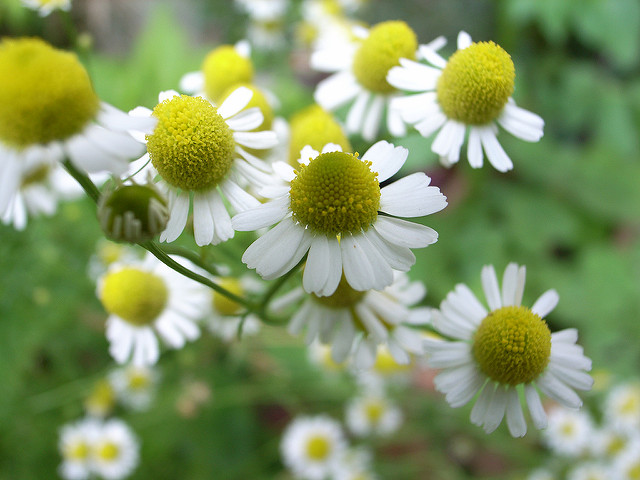
Chamomile by Toshiyuki IMAI – CC
The proposed mechanism for chamomile’s effects is via the high levels of apigenin present in the herb. Several studies on apigenin have demonstrated it’s anti-anxiety effects primarily by acting as a benzodiazepine ligand, similar to how a number of prescription anxiety medications work. It would be nice to see more confirmatory studies on chamomile itself to confirm these findings, but chamomile is relatively safe and can make a good addition to an herbal blend.
Peppermint is an herb frequently used in essential oils. The primary agent in peppermint oil responsible for its effects is menthol. While there is little evidence for peppermint having any effect on anxiety, it is effective as a muscle relaxant. If you are feeling tense as a result of anxiety/stress, peppermint tea can be a good option to help your body relax.
Conclusion
If I had to make a general recommendation on which tea is best for anxiety for most people, I would say an herbal mix containing lavender, passion flower, and lemon balm. A good choice is the Honey Lavender blend from Yogi, which contains all organic herbs. Buying through that link helps support our website as well. If these lighter herbal mixes don’t seem to do much for you, or if you want to experiment, give Kava a try.
The important thing to remember with all of this is to not get overwhelmed picking the absolute optimal tea. Pick one that tastes good to you and that you enjoy drinking over anything else. The mere act of taking time out of your day to prepare and drink a hot, soothing cup of tea can have a strong stress-relieving effect in and of itself. It helps take your mind off whatever is bothering you and
gives
you
space
to process your emotions.
Happy tea drinking!

